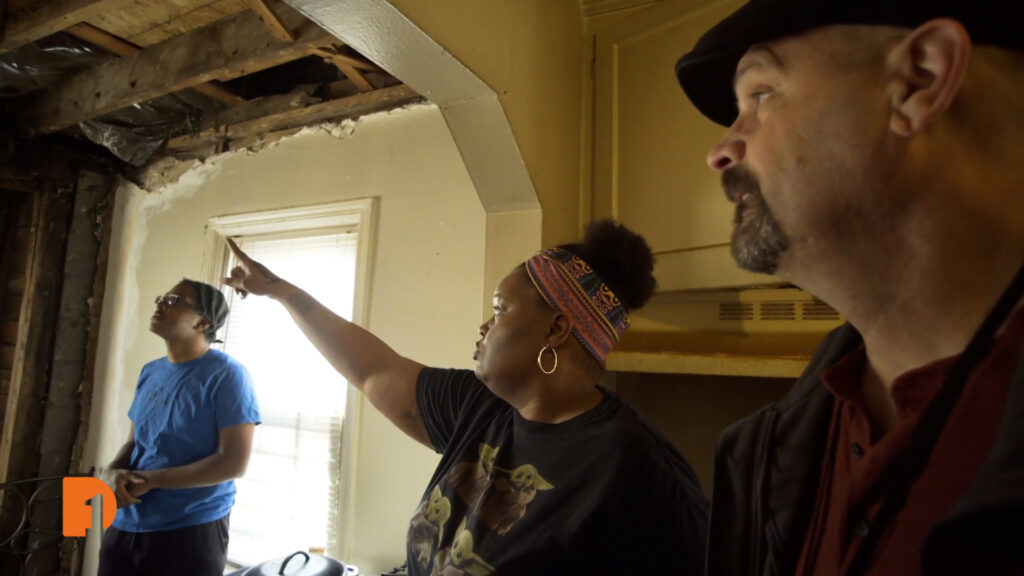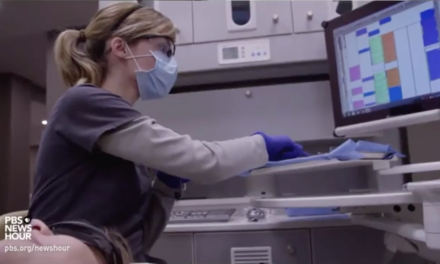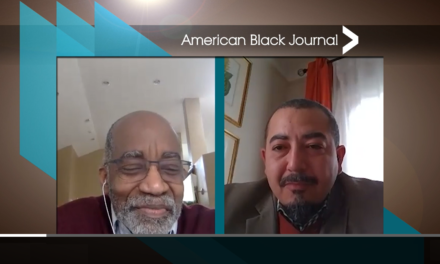Climate change continues to have an impact on some residents in Southeast Michigan. For the average homeowner, when it rains, one may grab a good book, kick their feet up and relax under the gloomy skies. For Detroit resident Semone Alexander, every time it rains, it’s anything but relaxing.
As heavy rains have become more frequent in the last half-decade, so has the flooding of Alexander and other residents’ homes— so much so that many of the homes have fallen into disrepair. For Earth Month, One Detroit Senior Producer Bill Kubota took a visit to Alexander’s home and talked with the United Community Housing Coalition about the damage Detroit’s harsher weather conditions is causing to the city’s older homes.

Detroit homeowner Semone Alexander points out water damage in her home to United Community Housing Coalition Repair Serviceman Tim Bishop. | Photo by One Detroit
RELATED: Hazardous housing: Environmental issues in older homes could lead to health issues
RELATED: Weathering the floods: Detroit neighborhood faces uncertain future due to climate change
Kubota talks with Coalition Executive Director Ted Phillips, who’s served as the director since 1986, about the increasing pace of record-setting rainfall we’ve been seeing in the region, as well as the issues around affordable housing and low-income tax credit housing in the city. Plus, he talks with Tim Bishop, who works in Repair Services for the Coalition, about the impact deferred maintenance has on older homes and how climate change may start to impact residents’ wallets too.
Full Transcript:
Tim Bishop, Repair Services, United Community Housing Coalition: So, if you want to take us back through.
Semone Alexander, Detroit Resident: Problem areas, I guess we can come through this way.
Bill Kubota, Senior Producer, One Detroit: Semone Alexander is showing Home repair pro, Tim Bishop her water damage on Detroit’s northeast side.
Tim Bishop: The cause and effect there on the roof has lingered for some time.
Semone Alexander: Yeah. This wood over here is rotting, so it has to be replaced before we’re able to do anything on the inside.
Tim Bishop: Yeah, that’s way worse than I thought. That’s gonna have to be restructured.
Semone Alexander: Normally, you would be like it’s raining, it’s a cool, calm day. But then when you’ve got house issues, you’re like please just please don’t rain today. You can stay cloudy, don’t rain. Cause it comes right in the house.
Bill Kubota: For want of a roof, add structural repairs, new ceilings, and electrical work. You’ve been at this for a while. Have you seen it get more significant or worse, even?
Ted Phillips, Executive Director, United Company Housing Coalition: I think it’s got a lot more significant the last several years. I’ve been director since 1986. Don’t think I’ve seen anything like what we’ve seen in the last, say, five years or so. It seems to be common now to hear on the radio news as you’re driving home, this is the worst amount of rain in this period of time, in, you know, 30 years or 40 years or ever.
Semone Alexander: This spot is kind of new. This one shocked me when it came down.
Bill Kubota: The United Community Housing Coalition, helps Detroiters avoid tax foreclosure and keeps them in their homes, despite the weather’s toll.
Tim Bishop: These houses are more susceptible to climate change, I think because they don’t have good roofs. It’s an older structure and a lot of deferred maintenance down here. So, it’s going to impact these houses even more.
Bill Kubota: With more storms, more high winds, damage from old trees.
Tim Bishop: You know, it affects gutters. Gutters are all collapsed. They’re not maintained, but they have standing water against the foundation like this here.
Bill Kubota: So much deferred maintenance. How long can these homes last?
Ted Phillips: Unfortunately, though, we don’t have the luxury of saying we just are going to get rid of it all and build new housing, because the reality is there isn’t enough to build enough low-income housing. What passes as affordable housing is usually what’s called low-income tax credit housing. And I was just looking the other day that the top rental level for low-income tax credit housing is like $1,200 a month. Many of the people that we represent even working are at $2,000 or less a month. So, the affordable housing that, we call affordable housing in that fashion, is not very affordable for weatherization.
Bill Kubota: Semone Alexander’s got more problems downstairs.
Tim Bishop: Yeah. So, how far does this is spread out?
Semone Alexander: Just this little spot.
Bill Kubota: Drainage trouble. Nothing like the big flood two years ago. Lost memorabilia and damaged appliances, but the pets can stay down here for now.
Tim Bishop: We did the furnace a couple of years ago during COVID. Now we’re going to follow back up. We’re going to put central air, attach central air to the system courtesy of DTE. AC may seem like a luxury, but if it does heat up more and more then it becomes more of a necessity, right?
Semone Alexander: Yeah, it does.
Tim Bishop: It will be expensive to run that central air. I mean, climate change is going to affect you one way or another. It’s going to run your utility bill up and that just gobbles up more of your, you know, if somebody is on a limited income, that just takes a disproportionate amount out of their pocket.
Stay Connected:
Subscribe to One Detroit’s YouTube Channel & Don’t miss One Detroit Mondays and Thursdays at 7:30 p.m. on Detroit Public TV, WTVS-Channel 56.
Catch the daily conversations on our website, Facebook, Twitter @DPTVOneDetroit, and Instagram @One.Detroit
View Past Episodes >
Watch One Detroit every Monday and Thursday at 7:30 p.m. ET on Detroit Public TV on Detroit Public TV, WTVS-Channel 56.




